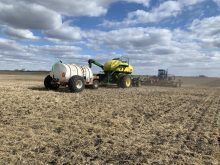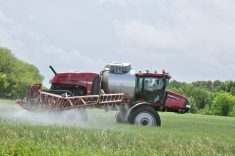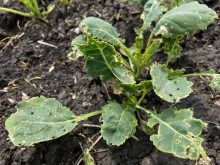SOUTHWEST:
Rainfall over the past week resulted in varying accumulations across the region, with less precipitation in the southwest areas to more precipitation in the northern areas. Overall moisture situation is rated as good. Temperatures over night dropped below 0 C with some areas reporting lows of -4 C. Cereal crop seeding is 15 to 25 per cent complete with the majority of the acres planted being wheat. Pulse crops are 50 per cent complete. The odd field of canola has been planted; the percentage of oilseed acres planted to date is low. Winter and spring annual weeds are growing quickly; some producers are considering weed control measures prior to seeding operations. Pastures and hay lands are starting to green up, helped by the recent rainfall.
Read Also

Critical growing season is ahead for soybeans
What the weather turns out to be in the United States is going to have a significant impact on Canadian producers’ prices
NORTHWEST:
Beginning mid-week continuing through the weekend, all areas of the region received general rain-and snowshowers; Dauphin area reported 150 mm of precipitation. Some localized field flooding will delay operations. Nighttime temperatures at or below freezing occurred in addition to lower day temperatures occurring in many areas in the latter part of the week.
Seeding of cereal crops ranges from 30 per cent complete in Swan River/The Pas to 70 per cent complete in other areas of the region. Some early-seeded wheat has emerged. Many producers are waiting to seed canola. Up to 50 per cent of the pea acres are planted. With the improving soil moisture conditions, favour-able weather will permit seeding to rapidly advance in all areas. Hay and pasture conditions have improved with the rain. Soil temperatures have dropped, slowing crop and annual weed germination, as well as the development of forages and winter annual weeds.
CENTRAL:
Welcome precipitation started Thursday resulting in varying amounts of accumulation across the region. Cereal seeding is 80 to 90 per cent complete in most areas and canola seeding ranges from 20 per cent complete in the Somerset and Gladstone areas to 60 per cent complete in the Morris/Altona areas.
Corn planting ranges from 50 to 70 per cent complete. Soybeans are 20 per cent complete, peas 30 to 50 per cent complete, sunflowers 30 to 50 per cent and potatoes range from 20 per cent at Portage, 50 per cent at Winkler to 80 per cent at Carberry.
Early-seeded cereals and canola are emerging. Some growers are waiting to seed canola and other frost-sensitive crops due to forecasts of below-freezing temperatures. Recent rains will allow for even germination of crops seeded to date, as well as germinate weeds. Winter annual weeds and volunteer canola are growing well. When field conditions allow, pre-seed burnoff is expected to start, given the good growth conditions for weeds. Forage and pasture are greening up and the latest rain will increase growth and yield potential.
EASTERN:
Cereal seeding is nearly 100 per cent complete throughout the region with some early-seeded wheat in the one-to two-leaf stage. Canola seeding ranges from 50 to 75 per cent complete. Some producers are done seeding their canola acres while other producers are waiting to start seeding. Corn planting is underway with some areas in the Eastman region reporting 50 per cent complete. Soybean seeding has started throughout the region but seeded acres are still limited. Many producers are waiting until the first or second week of May to start seeding their soybeans acres. Soil moisture conditions are rated as good to ideal following the rain that started on Thursday morning.
Many fields have reached saturation levels as some standing water in low areas and drainage ditches are being reported throughout the region. Winter wheat, hayfields and pastures are rated as very good with significant growth expected with increased temperatures. Wild oats, volunteer cereals and some broadleaf weeds such as Canada thistle, stinkweed and dandelions are growing in many fields.
INTERLAKE:
Warm, dry conditions continued at the start of the week, with cool, wet weather arriving toward the weekend bringing varying amounts of precipitation in the form of rain and snow. The Ashern area reported five to eight cm of snow on Monday. Field activity was general across the region early in the week. Seeding progress ranges from zero to 75 per cent with the most progress in the south Interlake.
Cereal seeding ranges from almost complete in the Stonewall-Warren areas to just starting in the Fisher Branch-Ashern areas. Canola seeding is well underway with approximately 50 per cent of the acres seeded in the southern areas, to only minimal acres seeded in the northern areas. Early-seeded canola has started to emerge.
Fertilizer application on winter wheat continued with producers wanting to apply prior to the rainfall. Majority of the winter wheat acres survived the winter well and the recent precipitation is welcome for continued growth. Hay and pasture conditions are excellent as the rainfall was welcomed in most areas.
Fertilizer applications continued through the week which will provide good results with rain to carry the fertilizer into the soil. Cattle are being transferred to pastures and supplemental feeding is taking place until grass growth accelerates.


















